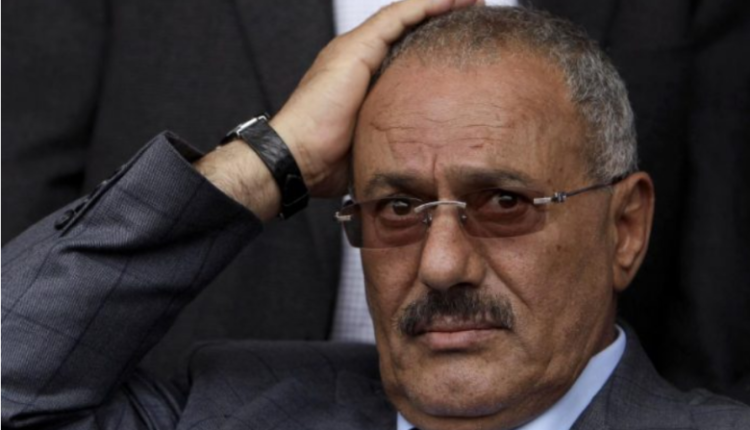How Saleh Turned Yemen into a Fragile Economy and a Crisis-Burdened Society
Over three decades of Ali Abdullah Saleh’s rule, Yemen shifted from a country with vast potential into a fragile economy and a society weighed down by crises. Poverty and unemployment were not accidents but the natural outcome of entrenched corruption, resource plundering, overreliance on oil, and failed economic and social policies.
Saleh’s governance was not merely mismanagement; it was a systematic project of sabotage—built on secret dealings with regional and international powers, the looting of public wealth, and the capture of state institutions for personal and partisan gain.
Begging for International Aid
At the 2006 London Donors’ Conference, Yemen secured financial pledges exceeding $4 billion, but rampant corruption and mismanagement under Saleh and his family prevented these funds from being effectively utilized.
Instead of building a sustainable economy, Saleh’s government consistently gambled on external aid to cover budget deficits. This dependency entrenched Yemen’s subservience to international organizations and donor states. Yet unemployment and poverty persisted, and the country sank deeper into debt—a fragile model prone to repeated crises.
A Dangerous Reliance on Oil
Under Saleh, Yemen became almost entirely dependent on oil as the main source of revenue, leaving the economy vulnerable to external shocks. This narrow reliance came without efforts to develop alternative production or tax bases. Instead, oil revenues were primarily used to fund family luxuries and secure political loyalty.
Key facts:
-
Oil accounted for 90% of exports and nearly three-quarters of government revenues.
-
Any drop in oil prices or production immediately crippled state salaries, subsidies, and basic services.
-
Instead of investing in infrastructure or development, revenues were wielded as a political tool to consolidate regime power.
Poverty and Unemployment
Living conditions during Saleh’s rule reflected the fragility of Yemen’s economy and governance:
-
World Bank reports indicate that by 2005/2006, 35% of Yemenis lived in poverty, despite soaring oil revenues.
-
Urban unemployment climbed steadily, especially among youth.
-
Food and fuel crises between 2007 and 2009 exposed the weakness of government safety nets, which failed to shield households from shocks.
Institutionalized Corruption
Corruption under Saleh was not a set of isolated cases—it became a systemic monster that devoured national resources and destroyed prospects for sustainable development. Instead of directing revenues into productive investment, funds were diverted to entrench patronage networks and non-productive spending.
-
Corruption penetrated every layer of government.
-
Patronage expanded while capital flight worsened.
-
A significant portion of oil income was wired abroad instead of being deposited in Yemen’s Central Bank, fueling currency depreciation and worsening economic instability.
Major Corruption Schemes Under Saleh
-
Oil revenues looted: Estimated at $500 billion, never reinvested in national projects.
-
Privatization scandals: Key state institutions, such as Yemen Airways and Aden’s water authority, were privatized under false pretenses, ending up in the hands of regime cronies.
-
Offshore accounts: Millions funneled to Dubai and Swiss banks, as revealed by The New York Times and Yemen’s Anti-Corruption Commission.
-
Blocked development projects: Youth empowerment programs in Hodeidah and Russian investment offers were obstructed unless illicit commissions of up to 30% were paid.
-
Aid manipulation: The $4+ billion pledged at the 2006 London Donors’ Conference was misused to cover temporary deficits rather than being invested in development.
Treason and Secret Ties with Foreign Powers
A 2016 Foreign Policy investigation revealed covert ties between Saleh and Israel, brokered through Emirati and Jordanian intermediaries, including military and technological deals rife with corruption.
-
In the 1990s, Saleh initiated “cultural normalization” under the guise of “Jewish heritage projects.”
-
Israeli listening posts were set up on Socotra and Mayun islands, disguised as “environmental” or “weather” stations, in exchange for military and financial support.
-
U.S. and Israeli forces collaborated with the regime in Yemen’s territorial waters, leading to the arrest and killing of Yemeni fishermen, as confirmed by former officers.
-
WikiLeaks documents exposed U.S. embassy interference in ministerial appointments in Sana’a to safeguard Saleh’s submissive policies.
Catastrophic Outcomes: A Society Under Siege
During Saleh’s rule, Yemenis endured the weight of an escalating crisis:
-
Sharp declines in oil revenues halted salary payments and crippled basic services.
-
The most vulnerable bore the brunt of corruption and systemic looting.
-
Yemen became almost fully dependent on foreign aid and loans to plug fiscal gaps.
-
Public consciousness was manipulated with hollow slogans of “stability” and “development,” while the country was being run by covert deals serving external powers and narrow personal interests.
Saleh’s Legacy: A Broken Nation
The legacy of Saleh’s regime is a textbook case of failed governance: systemic corruption, resource plundering, total dependency on oil and aid, and betrayal of national sovereignty.
This legacy left Yemen with a fragile society, a collapsed economy, rampant poverty, soaring unemployment, and a nation tethered to foreign dictates. It explains the ongoing suffering of Yemenis today and underscores the urgent need for a national effort to reclaim sovereignty and rebuild economic independence.
A National Lesson from Failed Governance
Yemen’s economic history under Saleh proves how corruption and irresponsible governance can destroy an entire state.
Today, Yemenis face the critical challenge of reclaiming their economy, building strong institutions, and protecting resources from returning to a cycle of waste and dependency—drawing lessons from the past to avoid repeating the tragedy of poverty, unemployment, and foreign subjugation.

